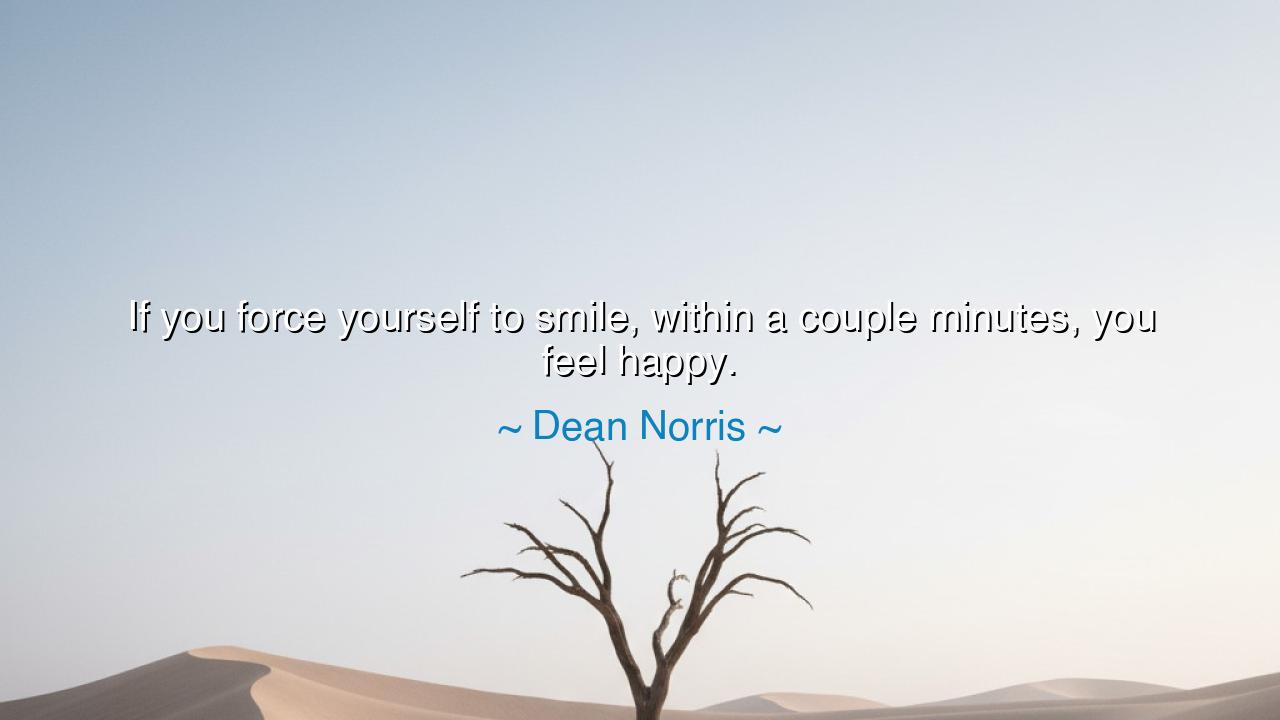
If you force yourself to smile, within a couple minutes, you feel






Hear the words of Dean Norris, spoken with the candor of one who has glimpsed a hidden truth: “If you force yourself to smile, within a couple minutes, you feel happy.” What seems at first a simple remark carries within it the wisdom of ages, for it reminds us of the sacred bond between body and spirit, gesture and soul. The ancients often taught that the way we hold ourselves shapes the way we think and feel, and Norris, in his own modern way, echoes that timeless law: action shapes emotion, and outward expression can summon inward light.
The smile is no mere ornament of the lips. It is a signal, a current that travels from the muscles of the face deep into the chambers of the heart. When one chooses, even against sorrow, to lift the corners of the mouth, the body whispers to the mind: all is not lost, there is still light, there is still reason to rejoice. And slowly, like the dawn breaking over a weary night, the feeling of joy begins to rise. This is the mystery of the human design: that we are not slaves to our emotions, but participants in their creation.
The ancients hinted at this truth in many forms. The Stoic philosophers spoke of how posture, voice, and action could cultivate inner calm. Marcus Aurelius counseled that if one wishes to be virtuous, they must act as though they already were, and soon the spirit would align with the deed. In the East, practitioners of yoga and meditation have long known that the shaping of the breath and the body influences the state of the soul. Norris’s smile, forced though it may begin, is a key within this ancient door: the practice of shaping one’s outer self to awaken the inner.
Consider the story of Viktor Frankl, the great psychiatrist and survivor of the concentration camps. Surrounded by horror, he observed that those who found even the smallest acts of will—lifting their head, offering kindness, even daring to laugh—could keep alive the flame of meaning. He wrote that man’s last freedom is to choose his attitude in any given circumstance. And what is the smile, even forced, if not such a choice? It is defiance against despair, a declaration that the spirit is not yet conquered.
The happiness that follows is not falsehood but transformation. What begins as discipline becomes sincerity, as the act itself awakens the emotion it seemed to pretend. Just as a warrior who lifts his sword with trembling hands may, through the act itself, find courage stirring in his chest, so too does the smile awaken the heart to gladness. What seems unnatural in the first moment becomes natural in the next, until one realizes that the light of joy has been rekindled by the simple daring to act it into being.
From this arises a lesson: do not wait for joy to come to you before you smile. Instead, offer the smile first, as a seed, and let the joy grow from it. Do not think you must be a prisoner of mood or circumstance, for within you lies the ancient power of command. Through small, deliberate gestures—lifting your face, straightening your posture, breathing deeply—you can summon strength and call happiness back into your being.
Therefore, O listener, let this teaching guide you: when sorrow weighs upon you, when heaviness drags your spirit down, do not surrender. Instead, lift your face and smile, even if at first it feels forced. Hold it, breathe into it, and soon you will find the burden lightened, the heart steadied, the flame of joy flickering anew. For happiness is not only a gift to be received—it is also a discipline to be practiced.
Thus Dean Norris’s words, light though they may sound, carry the gravity of ancient wisdom: that we are not passive in our emotions, but active co-creators of them. To smile is to summon the dawn; to force happiness into being through small acts is to remember that even in darkness, the human spirit has the power to shape its own light.






AAdministratorAdministrator
Welcome, honored guests. Please leave a comment, we will respond soon